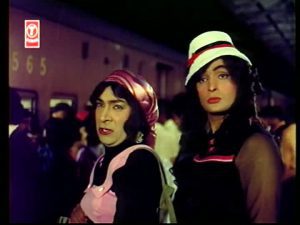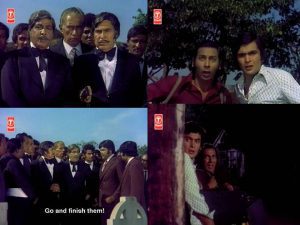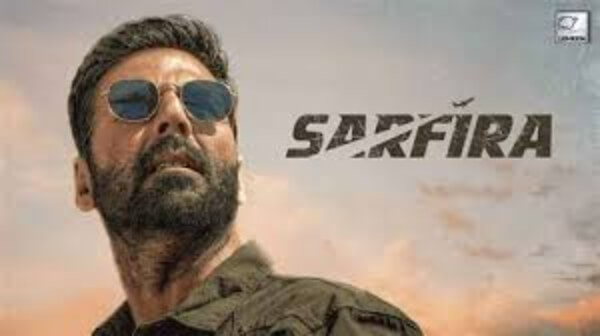At a time when men – Dev (Rishi Kapoor) and Salim (Paintal) – dressing up as women wasn’t a comedy norm, the mere transformation of both the actors is hilarious. Not to mention, the actors look like they’re having a blast. They swish and sway, giggle and chuckle and are very bold with their wardrobe choices, says Mariyam, exclusively for Different Truths.
The highlight of my memory of Rafoo Chakkar is Paintal sashaying down a hallway in a mini skirt. That was enough for me to fondly remember the film as well loved. So recently, I decided to see it again.
Rafoo Chakkar is a 1975 comedy, directed by Narendra Bedi, starring Rishi Kapoor, Neetu Singh, and Paintal in lead roles. It was an unofficial remake of Some Like It Hot. But the movie found a way of poking fun at itself. “Main hindi picturey nahi dekhti, sab English filmo ki copy hoti hai na”, says Rishi Kapoor looking directly into the camera.
 Dev (Rishi Kapoor) and Salim (Paintal) are small-time musicians who become witnesses to a murder. They disguise themselves as women (Devi and Salma respectively) and take refuge with a girls’ band on its way to Kashmir.
Dev (Rishi Kapoor) and Salim (Paintal) are small-time musicians who become witnesses to a murder. They disguise themselves as women (Devi and Salma respectively) and take refuge with a girls’ band on its way to Kashmir.
At a time when men dressing up as women wasn’t a comedy norm, the mere transformation of both the actors is hilarious. Not to mention, the actors look like they’re having a blast. They swish and sway, giggle and chuckle and are very bold with their wardrobe choices.
Rishi Kapoor looks nearly pretty, but it’s Paintal who takes the cake. His gender-identity confusion and his dilemma at the relentless pursuit by a rich suitor (played by Rajendra Nath) are comical but mostly sweet. After being serenaded for almost most of the film, he finally says yes to the marriage proposal and promptly informs Rishi’s character, “Ab main kisi aur ki amanat hu”.
Neetu Kapoor plays Ritu, a fellow band member with whom Dev falls in love. Unlike her Hollywood counterpart, she has a backstory and almost no objectifying camera angles.
There are two levels of villainy. There is the murderer and his accomplice who are after Dev and Salim. The accomplice also happens to be Dev’s father by the way (very Charles Dickensian, I know). Then, there’s a super evil villain who assigns super evil tasks to sub-villains from all over India in a banquet hall to bring about a gradual destruction of our country.
Of course because this is Hindi Cinema, there are also the heroes’ mothers, complete with their sacrifices and inconveniences, who selflessly bring the heroes up and make sure they stay out of trouble, except for when they straight up walk to the very thugs their sons are running away from and naïvely hand them their address in Kashmir. Or when they leave the railway station with the thugs only to realise later they’ve been kidnapped.
Ever notice how mothers and children were abducted in the exact same manner? The ma/kid gets out of station/school. The villain walks up and says, “Ma ji/beta, main apke bete/papa ka dost hu. Ayye, aapko apni gadi me chhor aau.”
This is a movie I wouldn’t hesitate to watch again because unlike Rishi Kapoor in the movie Main Hindi fimey dekhti hoon!
©Mariyam Zafar
Photos from the Internet
#RafooChakkar #HindiMovies #OldHindiMovies #Bollywood #RivisitingHindiMovies #Cinemascope #DifferentTruths







 By
By


 By
By